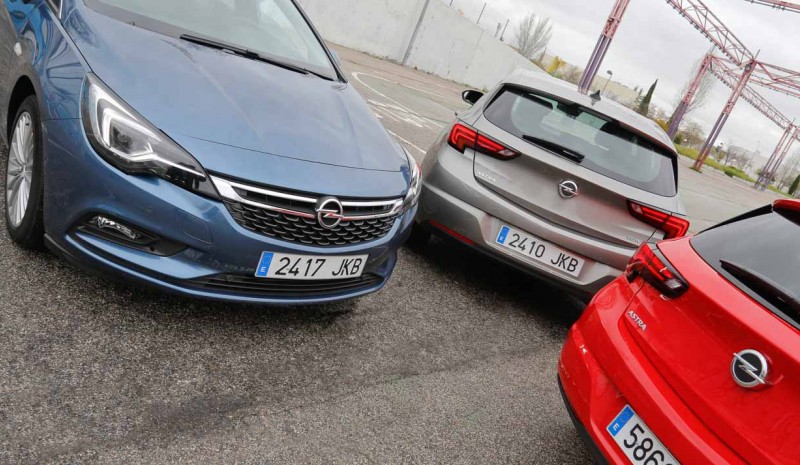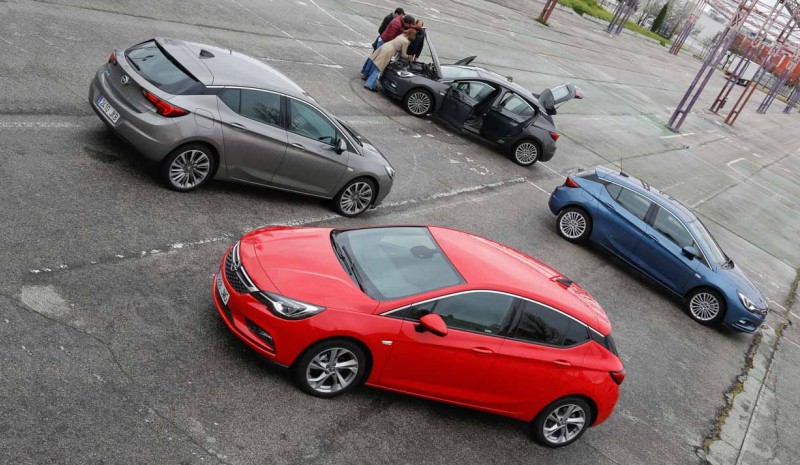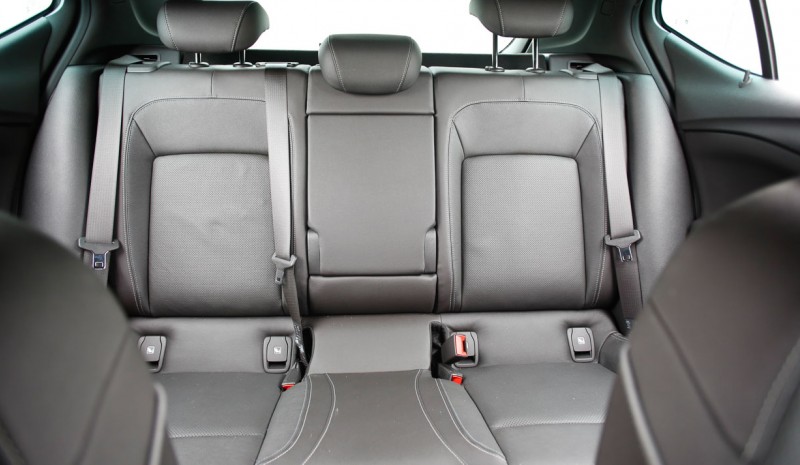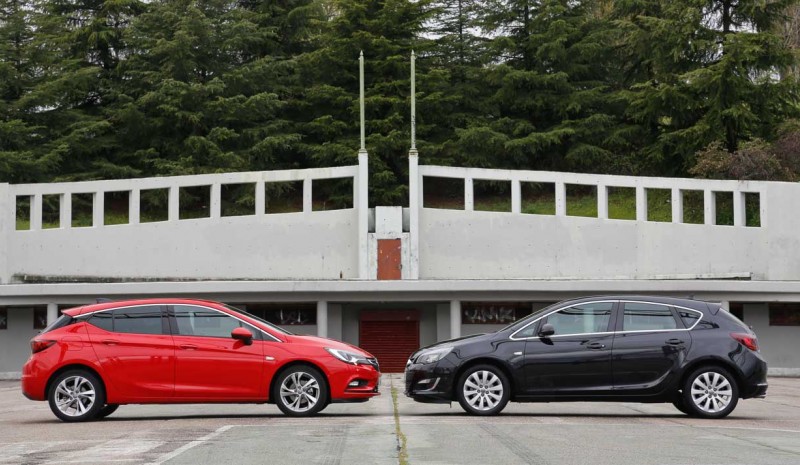What Opel Astra choose? Buying Guide
With the new generation Astra, Opel has made its new compact is one of the most efficient cars in the category. This has evolved from yesterday to today.


If you’ve started to read it is more than likely you’re in one of these situations: you have an Opel Astra and previous generations -in the gallery, the black car is Opel Astra generation and want to know saliente- What has improved in this new generation; or you need to know which brings the renovated and much improved Opel Astra respect to competition.
Opel Astra: lighter, smaller and equipped
We assume that you are aware of the major changes that hides the new Opel Astra model much more aerodynamic, lighter, smaller and theoretically, also more effective and efficient. Changes with the new Opel Astra It happens to occupy top positions considering only the latter two parameters: new engines stand out for making the Opel Astra faster than their peers, or because of less spending power to equal. And if you’re looking for a car in this category is comfort, safety and good touch driving, the Opel Astra, without being the best in absolute value, It provides a balanced positioning if, moreover, you enter the variable price and equipment.
Opel Astra: new family of petrol engines
Both three-cylinder 1.0 T and 1.4 Turbo, this in versions 125 and 150 hp They are incorporated into the new range while two 1.6 CDTi come from above. also you have a new twin-turbo 1.6 CDi 160 hp and 200 hp 1.6T, although we focus in this report on four alternatives of lower power, from 105 to 136 hp engines "faced" two to two chips in performance without the intention of becoming a double duel petrol / diesel, but to compare performances between engines of similar power. But I would not want to enter the pure and simple analysis without telling you now is me frankly attractive supply and staging of the petrol versions, although it is so small the price difference with its "alternative" you understand that you’ll end up dating a very good Diesel also Dealer: only 700 euros separated, for example, two heavy weights in the range: 1.4 Turbo 125 hp and 136 hp 1.6 CDTI. Entro now tell you what I would buy in the range and why or why rule.
Opel Astra, more feelings and my personal opinion
I was surprised how well it goes Opel Astra 1.0 Turbo though, and if you are looking for the cheapest of all Astra is better resolved than many other basic competitors choice. ANDs the only engine available in a more than decent finish Expression, the simplest: you have by 16,400 euros. version it exposes the BMW 116i, with also three cylinder 1.5 liter or equaling the performance of two of the best references between rival motor equivalent, as are the Pure Tech 308 1.2 / 110 also with change of 5 or speeds- Ford Focus 1.0 Ecoboost 125 hp. Hence Opel also provides the car with the best fuel consumption, which is no small feat. Despite its more than decent prestacional capacity, I would particularly like more the more spontaneity of 1.2 Peugeot and silkier the Ford EcoBoost touch, but I recognize that for use undemanding or if you do not use the heavily loaded car, it may be a more valid option.

Diesel Diesel. similar to the previous case. Same base, two power levels and hardly 500 euros difference between them. It is no longer decisive factor chassis because the rear axle with Watt becomes optional engines with less than 160 hp if you look at the benefits of both, you will see the 1.6 CDTi / 136 is not only obviously faster, but also more frugal. The difference in speed is not as wide as might be expected that not only increased power and torque, but employment in a shorter development -52.1 km / h in sixth per 1,000 rpm, compared to 56.6 km / h CDTI / 110-, that energize the response and achieve that gears be more usable in demanding conditions. It is also an engine that stands out among its peers for its responsiveness, but not the best in driving feel, softness, elasticity or noise. Among its rivals, rather the BlueHDi / 120 PSA or 1.6 i-DTEC Honda Civic for further refinement; and 1.6 dCi / 130 Renault Megane its even better punch and smoother. You get to choose, with the advantage that evolution experienced by the Astra at all levels, will be a sure hit.
| Brand | Opel Astra 1.0T | Opel Astra 1.6 CDTi |
| OFFICIAL RETURNS | ||
| Power | 105 hp | 110 hp |
| Max. | 200 km / h | 195 km / h |
| Acel. 0-100 km / h | 11,2 s | 11,0 s |
| urban consumption | 5,2 l / 100 km | 4.2 l / 100 km |
| C. Extraurb. | 3,9 l / 100 km | 3.3 l / 100 km |
| C. Mixed | 4.4 l / 100 km | 3.7 l / 100 km |
| CO2 | 102 g / km | 97 g / km |
| ACCELERATION | Time (s) | Time (s) |
| 0-50 km / h | 3.46 | 2,98 |
| 0-100 km / h | 10.63 | 9.46 |
| 0-400 m | 17.5 | 6.8 |
| 0-1000 m | 32.2 | 31.3 |
| BRAKING | Distance (m) | Distance (m) |
| 100-0 km / h | 36 | 39 |
| 120-0 km / h | 53 | 55 |
| 140-0 km / h | 69.1 | 72.8 |
| SONORITY | (DBA) | (DBA) |
| 100 km / h | 68 | 67 |
| 120 km / h | 71.6 | 70 |
| 140 km / h | 74 | 73 |
| OVERTAKING | Time (s) | Time (s) |
| 60 to 120 in 3rd | 10.7 | 9.8 |
| 80 to 120 in 4th | 10.48 | 7.57 |
| 80 to 120 in 5th | 14.8 | 8.9 |
| 80 to 120 in 6th | – | 11.2 |
| CONSUMPTION | l / 100 km | l / 100 km |
| Urban | 6.7 | 5.9 |
| Highway | 5.6 | 4.8 |
| Weighted average | 6 | 5.2 |
| Brand | Opel Astra 1.4T | Opel Astra 1.6 CDTi |
| OFFICIAL RETURNS | ||
| Power | 125 hp | 136 hp |
| Max. | 205 km / h | 205 km / h |
| Acel. 0-100 km / h | 9.5 s | 9.6 s |
| urban consumption | 6,3 l / 100 km | 4.5 l / 100 km |
| C. Extraurb. | 4.3 l / 100 km | 3.5 l / 100 km |
| C. Mixed | 5.1 l / 100 km | 3,9 l / 100 km |
| CO2 | 117 g / km | 103 g / km |
| ACCELERATION | Time (s) | Time (s) |
| 0-50 km / h | 3,25 | 3.07 |
| 0-100 km / h | 9.26 | 8.8 |
| 0-400 m | 16.8 | 16.5 |
| 0-1000 m | 30.8 | 30.5 |
| BRAKING | Distance (m) | Distance (m) |
| 100-0 km / h | 68 | 38 |
| 120-0 km / h | 70 | 55 |
| 140-0 km / h | 73 | 72.4 |
| SONORITY | (DBA) | (DBA) |
| 100 km / h | 68 | 67 |
| 120 km / h | 70 | 68.4 |
| 140 km / h | 73 | 72 |
| OVERTAKING | Time (s) | Time (s) |
| 60 to 120 in 3rd | 9.4 | 8.8 |
| 80 to 120 in 4th | 7.86 | 6.62 |
| 80 to 120 in 5th | 10.3 | 8 |
| 80 to 120 in 6th | 13.3 | 10.1 |
| CONSUMPTION | l / 100 km | l / 100 km |
| Urban | 8.1 | 5.7 |
| Highway | 5.4 | 4.5 |
| Weighted average | 6.5 | 5 |
You may also like:
Opel Astra Sports Tourer, Astra new generation more familiar
50,000 km test with Mégane 1.6 dCi Renault, prologue stage
Peugeot 308, long-term test: nearly 150,000 km traveled



